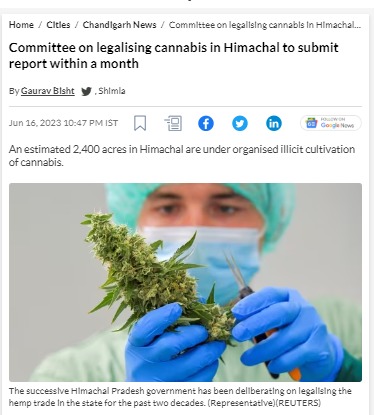Committee on legalising cannabis in Himachal to submit report within a month
22-Jun-23 05:06:50

An estimated 2,400 acres in Himachal are under organised illicit cultivation of cannabis.
With the cash-strapped state government keen to legalise industrial hemp cultivation, the legislators’ panel constituted by chief minister Sukhvinder Singh Sukhu to explore the possibility of hemp cultivation will submit its report within a month.
During the budget session, Sukhu constituted a five-member committee headed by revenue minister Jagat Singh Negi. Other members comprised chief parliamentary secretary Sunder Thakur, MLA Hans Raj, Dr Janak Raj and Puran Thakur.
The committee members toured Madhya Pradesh and Uttarakhand to study their model. “It’s clear that the state government will adopt an altogether approach of non-narcotic use of hemp plants to generate revenue besides creating livelihood opportunities for people,” said Negi. The committee has studied all aspects of regulation policy. But so far, the committee is yet to set the jobs and revenue targets the government wants to generate from legalising hemp.
“The committee has looked at all aspects of regulations and policy framework to open the market for medical and industrial use of hemp to provide patients with access to safer natural medicines and for making available biodegradable or organic alternatives to plastic and construction material in the state.
“The government has held discussions with representatives of panchayati raj institutions. So far no one is against the proposed plans of the government,“ he said.
The committee also analysed the scope of the hemp market in the state with a focus on environmental benefits.
The successive Himachal Pradesh government has been deliberating on legalising the hemp trade in the state for the past two decades. Cannabis is exploited for making narcotics. An estimated 2,400 acres in Himachal are under organised illicit cultivation of cannabis. Charas worth ₹960 crore is smuggled out of the state each year and find their way to Western European and Scandinavian countries, while in Israel there is demand for malana cream.
The cannabis produced in the state is of high quality and there is potential to undertake its controlled cultivation. Under the NDPS Act of 1985, there are provisions for the cultivation, production, maintenance and transportation of cannabis.
Himachal Pradesh is not the first state to legalise cannabis cultivation for medicinal purposes and industrial use to boost its economy. Neighbouring Uttarakhand did so in 2017 followed by Madhya Pradesh.
Hemp, the plant from which charas is extracted as resin, grows in the wild in all districts of the state barring Lahaul and Spiti. In the remote regions of the Kullu district, hybrid hemp is sown clandestinely by foreigners to extract high-quality charas, which are sold at exorbitant prices abroad and at key destinations in India.
Former CM Jai Ram Thakur had worked on a plan to legalise cannabis cultivation in the state. The BJP government had hoped to earn ₹18,000 crore annually apart from generating job opportunities. The BJP government had targeted to generate 50,000 jobs and benefit 2.8 lakh families.
SOURCE & CREDIT: HINDUSTAN TIMES